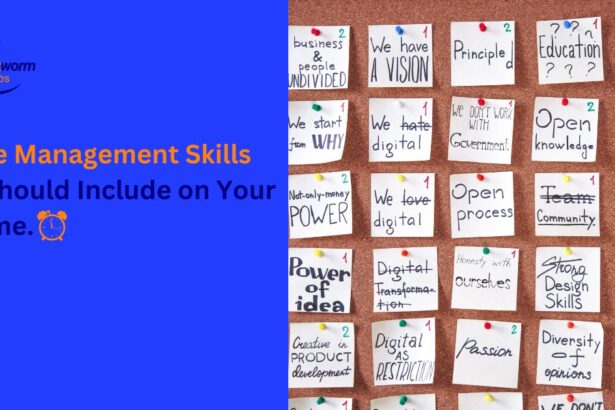Soft skills are personal traits that are crucial to success in any workplace. Here’s how to add them to your resume.
A study by Wonderlic found that 93% of employers think soft skills are “very important” or “essential.”
But, most job applicants tend to focus on their hard skills. They emphasize their education and experience, without giving the same attention to their soft skills. This is a mistake. Employers care about soft skills more than people think.
In this article, you’ll find the top 15 soft skills examples, why they’re important, and how to add them to your resume.
The top 15 soft skills examples:
- Communication
- Organization
- Teamwork
- Problem-solving
- Critical thinking
- Adaptability
- Conflict resolution
- Time management
- Leadership
- Creativity
- Decision-making
- Persuasion
- Stress management
- Negotiation
- Presentation
What are soft skills?
Soft skills, or people skills, are character traits. They are interpersonal abilities that affect how well you can work and interact with others. They are often less tangible and harder to measure.
Above all else, employers want to know they can rely on you to show up and work well with others. Forming interpersonal relationships, managing conflicts, having a positive attitude, and relating to customers and co-workers are crucial in any workplace.
Hard skills vs. soft skills
There are two types of skills recruiters look for on resumes: hard skills and soft skills. A combination of the two are needed to form a well-rounded job applicant.
Hard skills are taught skills. They can be measured and are often learned in school, through certifications, or from past jobs. Hard skills are specific to each job and are often the basis of job requirements.
Soft skills are typically interpersonal people skills or desirable personality traits that revolve around character, teamwork, communication, time management, and work ethic. Soft skills tend to be transferable between jobs or industries but are more difficult to quantify on a resume than hard skills.
Are soft skills important?
According to research conducted by Harvard University, 85% of job success comes from having well-developed soft and people skills, with only 15% attributed to technical skills. This underlines the substantial impact soft skills have on professional success.
Hiring teams use soft skills to make key decisions when trying to fill roles. Soft skills can help recruiters:
- Identify candidates who can fill the role most effectively relative to other candidates.
- Decide between equally qualified candidates in terms of experience, hard skills, and qualifications.
- Consider the culture fit and not just knowledge or experience.
- Make well-rounded hiring choices.
The top 15 soft skills examples
The following are the soft skills that employers value the most. This is because they can help you get along with your team and tackle work challenges more smoothly.
1. Communication
You’ve probably heard the saying communication is key—and that’s true in any career.
Communication is the ability to convey information effectively and efficiently. It’s an incredibly in-demand skill to have because it makes sure that all processes go smoothly, work flows are transparent, and helps in building strong relationships.
Workplace communication involves articulating concepts concisely during collaborative sessions. It also includes active listening in team discussions, and writing clear emails.
To develop this skill:
- Practice public speaking
- Engage in active listening exercises
- Take communication courses
2. Organization
Prioritizing and completing your daily tasks makes organization one of the top soft skills.
Organization involves the ability to structure and manage tasks and responsibilities effectively. It’s crucial for meeting deadlines and achieving goals.
To develop this skill:
- Use planners and to-do lists
- Set short and long-term goals
- Regularly declutter your workspace
3. Teamwork
While being able to complete your work independently is crucial, so is working well with others.
Collaborating and brainstorming with a common goal in mind opens you up to different ideas you may have not originally considered. Teamwork is the ability to work effectively and harmoniously with others. It’s important because it promotes collaboration and innovation.
Being an active listener and having compassion are the cornerstones of being a good team player. You should also be receptive to any constructive feedback. This might involve participating in team projects, sharing ideas openly, and supporting colleagues.
To develop this skill:
- Engage in team-building activities
- Practice active listening
- Be open to feedback
4. Problem solving
Not everything can run perfectly all of the time. When you hit a roadblock, having problem-solving skills helps you find a solution quickly and effectively. It’s the ability to find solutions to challenges and obstacles.
Recognizing what’s not working requires having an open mind and listening to others. You need to be able to take the time to examine and analyze current processes. Once you’ve identified the problem, approach it in a patient, analytical manner.
For example, troubleshooting means solving technical issues. Resolving conflicts means fixing fights among team members. And, finding ways to improve efficiency.
To develop this skill:
- Practice critical thinking
- Engage in brainstorming sessions
- Take courses in problem-solving

5. Critical thinking
Thinking critically means taking a look at the bigger picture. Coming up with new ideas and implementing change is part of every job, and you need to be rational when doing so. Analyze carefully, do the necessary research, and be objective in your decisions.
Critical thinking can involve analyzing data to make decisions. It means evaluating the pros and cons of different approaches and finding risks.
To develop this skill:
- Productively debate
- Take courses in logic and reasoning
- Practice problem-solving exercises
6. Adaptability
When things don’t go as expected, being adaptable is a crucial soft skill. If you’re suddenly given a new responsibility or there’s a change in management, this makes it possible to adjust and learn with ease. This doesn’t mean you should hesitate to ask questions.
Adaptability includes acting with curiosity, learning from your mistakes, and quick thinking. Try to be flexible and eager to take on different tasks. It might also involve learning new software fast. You’ll need to adjust to changes in project scope and handle unexpected issues well.
To develop this skill:
- Embrace change
- Seek out new experiences
- Practice flexibility in daily tasks
7. Conflict resolution
Conflict resolution is the ability to resolve disputes and disagreements constructively. To become a skilled conflict resolver, you must be willing to get to the bottom of the issue. Listen to all sides, ask questions, and act with empathy toward the situation.
Making others feel heard helps lead to satisfaction from all parties. You should also focus on compromising and communicating in a calm manner. It’s important for maintaining a positive and productive work environment.
At work, conflict resolution means mediating disputes. It also means negotiating solutions and keeping professionalism during disagreements.
To develop this skill:
- Practice active listening
- Learn negotiation techniques
- Take conflict resolution courses
8. Time management
This soft skill goes hand in hand with organization. Obviously showing up to any job on time is important, but it’s more than that. Time management is the ability to use one’s time effectively and productively.
Planning, preparation, and prioritization allow you to make the most of your time and not waste anyone else’s. It also involves scheduling meetings in a way that works for everyone. It’s important for ensuring timely completion of tasks and projects.
Time management might involve meeting deadlines, prioritizing tasks, and avoiding procrastination. To develop this skill:
To develop this skill:
- Use time-tracking tools
- Set clear priorities
- Break tasks into manageable steps
9. Leadership
Being a leader doesn’t come naturally to everyone, but you can work up to it through experience. Share your ideas, collaborate, and go above and beyond when you can. Leadership is the ability to guide, inspire, and influence others.
Strong leaders also know when to step back and listen. Leading with compassion raises morale and encourages others to reach common goals and meet deadlines. It’s essential for motivating teams.
Leadership might involve leading project teams. It might involve mentoring junior employees. It also involves setting and sharing vision and goals.
To develop this skill:
- Take on leadership roles
- Seek feedback from peers
- Attend leadership training programs
10. Creativity
Creativity is the ability to think outside the box and generate innovative ideas. It’s important because it drives innovation and engagement. While those with more technical jobs may not place as much value on creativity, it’s a productive soft skill to have in any field.
Coming up with original concepts and ideas requires imagination and curiosity. Being innovative leads to more engagement and excitement, whether it’s among customers or co-workers. It might involve developing new product ideas, finding creative solutions to problems, and improving existing processes.
To develop this skill:
- Start creative hobbies
- Brainstorm regularly
- Challenge yourself to think differently
11. Decision-making
Decision-making as a soft skill refers to the ability to make effective and timely choices, often in situations where there is incomplete information or multiple possible courses of action. It involves a combination of cognitive abilities, personal attributes, and interpersonal skills.
Decision-making is a valuable soft skill for employers. It boosts problem-solving, enhances leadership, and shows adaptability.
To develop this skill:
- Practice making decisions
- Seek feedback to discover areas for improvement
- Learn decision-making frameworks
12. Persuasion
Persuasion is the ability to influence others to think, feel, or act in a certain way. It’s not just about making your point. It’s also about knowing your audience. You need to build rapport and share your ideas in a way that connects with them.
At the core of persuasion is effective communication, active listening, and empathy. Creating stories that connect with your audience makes your message more engaging. This helps it stick in their minds and boosts its persuasive power.
To develop this skill:
- Build credibility as a trustworthy source
- Observe how others use persuasion
- Practice persuasion in discussions and presentations
13. Stress management
Controlling stress is key to protecting your physical, mental, and emotional health. This is the core of stress management. It means creating ways to handle stress, keep balance, and succeed in tough times.
Stress management skills include self-awareness, emotional intelligence, problem-solving, and resilience. These are crucial attributes to have, especially in high-stress work environments.
To develop this skill:
- Practice mindfulness
- Prioritize self-care
- Work on self-awareness
14. Negotiation
Negotiation means communicating well to find an agreement that works for everyone. It means understanding what everyone needs and wants. Then, find common ground. Also, explore creative options for a win-win outcome.
Successful negotiation builds trust and rapport. It creates mutual understanding and strengthens relationships with colleagues, clients, and other stakeholders. Negotiation builds teamwork by promoting open talk, respect, and shared goals.
To develop this skill:
- Take courses or workshops about negotiation
- Read books about negotiation
- Develop communication skills
15. Presentation
Presentation skills help you share information clearly with an audience. It’s not just about speaking. It’s about shaping your message. You need to engage your audience and use different tools. This makes your presentation clear, persuasive, and memorable.
Presentation skills can include:
- Audience engagement
- Content creation
- Visual aids
- Verbal communication
- Non-verbal communication
To develop this skill:
- Watch skilled presenters
- Practice giving presentations
- Take workshops on public speaking
Which soft skills should you add to your resume?
If you’re unsure which soft skills you should put on your resume, read the description of the job you’re applying to. It will outline the hard and soft skills that are most important for that role.
Here’s a sample job description with the soft skills highlighted. The candidate applying for this job would benefit from adding these soft skills to their resume. By adding skills from the job description to your resume, you make your resume more searchable in the app.
First, start building your resume by selecting “Create a new resume.”
Then, type your current job title or a similar role title that you’re targeting. If you have a job in mind already, match your job title to the job posting to boost your chances of capturing the hiring team’s attention.
After you input your job title, the resume builder will generate an assortment of common skills you can include.
In the example below, typing “receptionist” brought up a long list of skills for resumes. These include both hard and soft skills. Key soft skills like conflict resolution, multitasking, problem-solving, and adaptability are near the top. It signals that these are non-negotiable skills to include on a receptionist’s resume.
The generated list can prompt you to add skills you forgot you have or give you ideas for bullet points. You can select any skills you want to add, which makes building your resume skills section effortless.
How to highlight soft skills on your resume
Here’s a guide on how to list soft skills on your resume:
1. Identify relevant soft skills
Start by identifying the soft skills that are most relevant to the job you are applying for. Note skills like communication, teamwork, work ethic, problem-solving, or active listening.
2. Integrate soft skills with your experience
Instead of just listing soft skills, integrate them into the descriptions of your previous job experiences. For example, under a previous job title, you might include a bullet point like, “Led a team of 12, fostering clear communication and problem-solving. This increased project efficiency by 15%.”
3. Use specific examples
Provide specific soft skills examples. For instance, “Improved customer satisfaction by 20% through effective communication and active listening.”
4. Include soft skills in your summary
Your resume’s summary or objective is a good place to highlight key soft skills. For example, “Dedicated and empathetic customer service professional”, “Strong communication and interpersonal skills”, or “Improved client relations at A1Media Company.”
5. Quantify your skills where possible
Whenever you can, quantify your achievements related to soft skills. For example, “Managed a diverse team of 12” and “Increased their productivity by 30% with good motivational strategies.”
6. Balance soft skills with hard skills
Ensure there’s a good balance between soft and hard skills on your resume. While soft skills are important, employers also look for technical or job-specific skills.
7. Customize for each application
Tailor your soft skills examples for each job application. Different roles require different soft skills. So, it’s key to adapt as needed.
8. Avoid overused buzzwords
Try to avoid the use of overused buzzwords like “team player” or “hard worker.” Instead, prove these qualities through specific examples.
9. Use action words
Use action verbs that convey the application of your soft skills, such as “collaborated,” “facilitated,” or “negotiated.”
How employers assess and e
Employers use different ways to check soft skills during hiring. Soft skills like communication, teamwork, problem-solving, and adaptability are very important for success. Here’s a detailed look at how to evaluate these skills:
1. Behavioral interview questions
These questions help employers understand how you have used soft skills before. Questions like “Tell me about a time you overcame an obstacle” or “Describe a situation where you had to work with a difficult team member” show how you handle real-life situations. You should use the STAR method (Situation, Task, Action, Result) for detailed answers.
2. Hypothetical scenarios and role-playing
Role-playing and pretend scenarios help employers see how you deal with work situations. For example, asking, “How would you handle a project deadline that your team is struggling to meet?” shows problem-solving and time management skills. Role-playing can show how you handle conflict, show empathy, and communicate well.
3. Job simulations and situational exercises
Job simulations involve doing tasks you would do in the job. These exercises can check many soft skills, like decision-making, leadership, and teamwork. For example, you might lead a team project or resolve a customer complaint to show your abilities.
4. Personality and soft skills tests
Tests like the Myers-Briggs Type Indicator or the Caliper Profile can show your personality traits and soft skills. These tests help find strengths and areas to improve, making sure you fit the company culture and job needs.
5. Reference checks
Employee references can certainly paint a picture of how your soft skills stack up. It’s worth noting that if anything is in question, there are other references to provide as well.
Checking references from non-work contexts, like a sports team or volunteer group, can give a full view of a your soft skills. Talking to someone who knows you outside of work can show your leadership, communication style, and teamwork abilities.
6. Post-interview activities
Activities after the interview, like a casual lunch or team meeting, can help assess your manners and social skills. Watching how you interact in a relaxed setting gives more information on your people skills and self-awareness.
7. Self-assessment and 360-degree feedback
Self-assessments let you think about your soft skills. Feedback from colleagues, managers, and direct reports gives a full view of your abilities. This method is useful for checking current employees’ development needs.
Soft skills by job title
Understanding which soft skills are essential for specific job roles can help you tailor your resume and prepare for interviews. Here are some key soft skills needed in different jobs. These skills are vital for success in many areas.
Account manager
Account managers work in a variety of fields. These include sales and marketing, finance and banking, healthcare, advertising, technology, and retail. Key soft skills include communication, negotiation, and relationship management.
Soft Skills needed for This job:
- Communication
- Negotiation
- Relationship building
- Customer service
- Time management

Financial analyst
Financial analyst skills involve helping organizations make sound financial decisions. Analysts examine financial data, create financial reports, and make recommendations based on their findings. Critical thinking, attention to detail, and problem-solving are essential.
Soft Skills needed for This job:
- Analytical thinking
- Attention to detail
- Problem-solving
- Decision-making
- Research
Graphic designer
Graphic designers create visual content to communicate messages. They combine creativity with technical skills to produce designs for print and digital media. Creativity, time management, and collaboration are vital soft skills for success.
Soft Skills needed for This job:
- Creativity
- Time management
- Collaboration
- Attention to detail
- Adaptability
Recruiter
Recruiters need to be excellent communicators, both in written and verbal forms, as they interact with job candidates and clients throughout the hiring process. Interpersonal skills, active listening, and organization are crucial.
Soft Skills needed for This job:
- Communication
- Active listening
- Relationship building
- Empathy
- Negotiation
Marketing manager
Being a marketing manager requires a combination of marketing expertise, leadership skills, and a commitment to driving the growth and success of the organization’s brand and products. Leadership, strategic thinking, and creativity are key soft skills.
Soft Skills needed for This job:
- Leadership
- Strategic thinking
- Creativity
- Project management
- Collaboration
Software engineer
Software engineers need to be analytical, detail-oriented, and proficient in programming languages. They also need to be able to work collaboratively in teams, communicate effectively with colleagues, and manage their time effectively to meet project deadlines. Problem-solving, teamwork, and adaptability are critical.
Soft Skills needed for This job:
- Problem-solving
- Teamwork
- Adaptability
- Analytical thinking
- Time management
Data analyst
Data analysts interpret complex data to help organizations make informed decisions. They must possess strong analytical skills and attention to detail, along with the ability to communicate their findings effectively. Critical thinking, problem-solving, and communication are essential.
Soft Skills needed for This job:
- Analytical thinking
- Attention to detail
- Critical thinking
- Problem-solving
- Communication
Web developer
Web developers build and maintain websites, ensuring they are functional, user-friendly, and visually appealing. They need technical expertise and the ability to collaborate with designers and other developers. Technical proficiency, problem-solving, and creativity are key soft skills.
Soft Skills needed for This job:
- Problem-solving
- Creativity
- Collaboration
- Time management
- Adaptability
Data scientist
In the increasingly data-driven world, data scientists play a crucial role. They combine statistical analysis, data management, and advanced technology to turn large amounts of data into actionable insights. Analytical thinking, problem-solving, and creativity are essential.
Soft Skills needed for This job:
- Analytical thinking
- Problem-solving
- Creativity
- Research
- Innovation
CNA (certified nursing assistant)
Certified nursing assistant skills, or CNA skills, include caring for people with patience, empathy, and accuracy. Hospitals, long-term care residences, senior living communities, and rehabilitation centers often need CNAs to care for clients and patients. Empathy, attention to detail, and communication are crucial soft skills.
Soft Skills needed for This job:
- Empathy
- Communication
- Attention to detail
- Patience
- Adaptability
FAQs
What are soft skills examples?
Soft skills examples include:
• Communication
• Teamwork
• Problem-solving
• Adaptability
• Time management
• Conflict management
• Leadership
• Strategic thinking
The right soft skills are essential for career success as they help individuals interact effectively with colleagues, clients, and customers.
How do you improve soft skills?
Soft skills are about personal traits. You can’t always learn them just by studying or taking classes. Work on your soft skills by improving yourself. Focus on areas that boost your job performance and help your professional growth.
To improve time management, create a daily schedule. Track how long you spend on each task. Also, try to avoid multitasking. Taking a public speaking course can help you develop good communication skills. Discover your key soft skills by reflecting on yourself, journaling, and reading self-help books.
What are soft skills?
Soft skills pertain to personal characteristics, social skills, and emotional intelligence. They help you thrive in a professional setting.
What is the difference between a soft skill and a hard skill?
Hard skills are the specific, teachable abilities that can be defined and measured. These are often the technical skills required to perform a particular job, such as coding, data analysis, or financial accounting.
Soft skills, in contrast, are the interpersonal skills that are more challenging to quantify. They encompass qualities like communication, teamwork, problem-solving, and adaptability.
While hard skills are essential for executing the technical tasks of a role, soft skills are crucial for navigating workplace dynamics, collaborating effectively, and managing one’s own work and relationships. Both types of skills are vital for career success, as they complement each other and contribute to a well-rounded professional profile.
How should you talk about your skills in a job interview?
When discussing your skills in a job interview, preparation is key. Begin by thoroughly understanding the job description and identifying the required skills. Then, inventory your own skills, both hard and soft, and prepare specific examples using the STAR method (Situation, Task, Action, Result) to demonstrate them in action.
During the interview, be concise and relevant, focusing on the skills most pertinent to the role. Provide concrete examples, quantify your achievements whenever possible, and tailor your answers to address the interviewer’s specific questions and concerns. Highlight transferable skills, even if your experience isn’t a perfect match, and be honest about your strengths and areas for growth.
Frame any weaknesses as opportunities for development and express your enthusiasm for the role. Remember, it’s not just about listing your skills, but showcasing how you’ve used them to achieve results.
How to make your skills stand out?
Start by looking closely at job descriptions to find the key skills employers want. Then, highlight those skills by sharing clear examples of your achievements.
Quantify your impact whenever possible, using numbers and data to demonstrate your successes. Tailor your resume and cover letter to each application, using keywords from the job description.
In interviews, use the STAR method. It helps you organize your answers and share strong examples of your skills. Show more than just skills. Highlight personal projects, your portfolio, or a strong online presence.
After you get the job, keep learning. This helps your skills stay fresh and useful in today’s changing job market. Show your skills with clear results and take charge of your growth. This way, you’ll stand out as a leading candidate.




